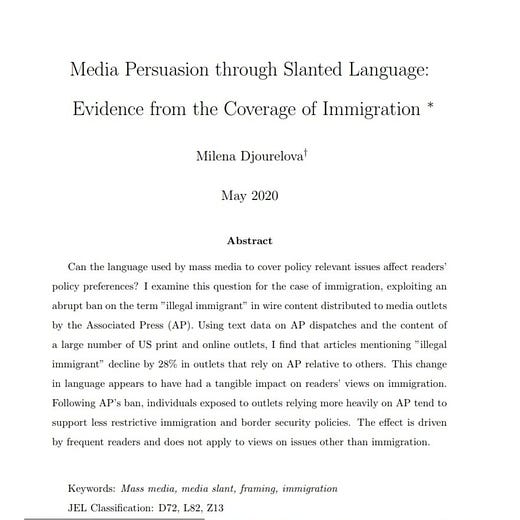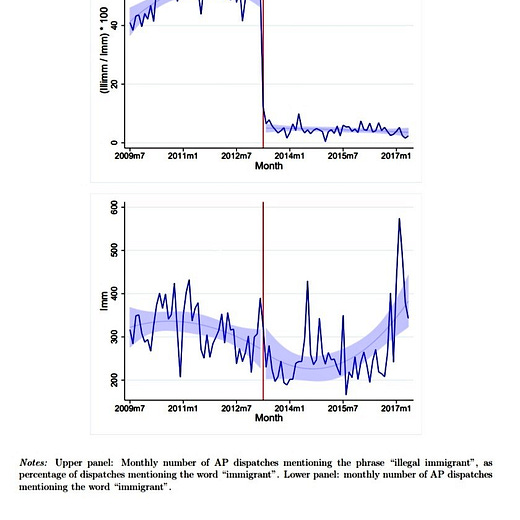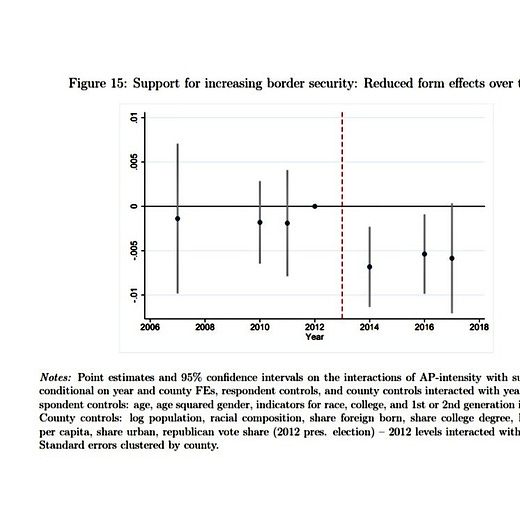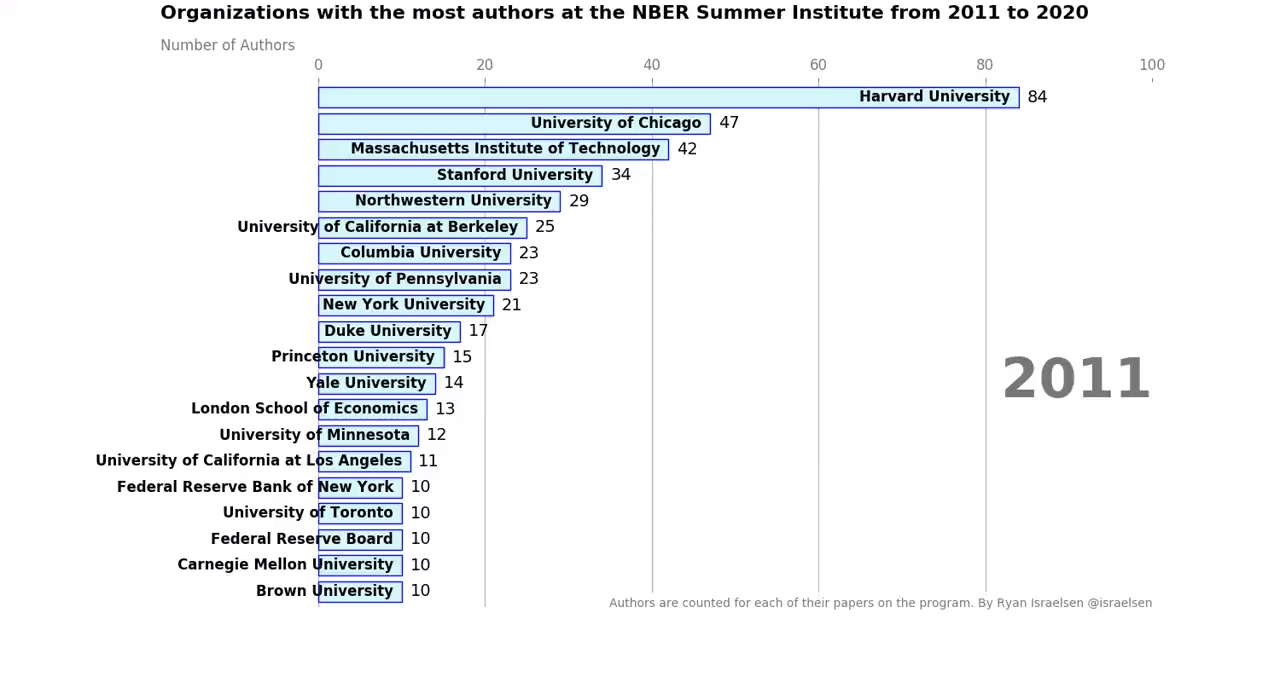Best of #econtwitter - Week of June 14, 2020
Jun 21, 2020
Welcome to this week’s edition of the Best of Econtwitter. Recommendations always welcome over email or on Twitter @just_economics.
New papers

Leah Boustan@leah_boustan
I am excited to share some new research on historical immigrant enclaves and upward mobility
Joint work with @stats4geo and Ran Abramitzky
nber.org/papers/w27372

1:48 PM · Jun 15, 2020
58 Reposts · 189 Likes

Gianluca Violante@glviolante
1/n Thread to describe this paper

NBER @nberpubs
Recessions have persistent effects on non-participation in the labor force and impact the long-run dynamics of earnings inequality at the bottom of the distribution, from @Jonheathcote, Fabrizio Perri, and @glviolante https://t.co/helU2E1Nv5 https://t.co/IXQnMDc917
5:53 PM · Jun 16, 2020
40 Reposts · 146 Likes

Ajay Shenoy@AjaycencyMatrix
How to estimate a production function, esp in a developing country? Check out my forthcoming paper in REStat. Bottom line: many popular methods don't work when input markets have frictions or firms are constrained (1/N)

The Review of Economics and Statistics (REStat) @restatjournal
If input markets are flawed the usual production function estimators may not work.
Find out what does in the just accepted new paper by Ajay Shenoy @AjaycencyMatrix available here: https://t.co/LF7zqOiv1x
1:20 PM · Jun 15, 2020
32 Reposts · 144 Likes

Oleg Sobchuk@oleg_sobchuk
Do films become “better” over time? Or, to put it differently: is there cumulative cultural evolution in film history? Our new paper with Peeter Tinits @yrgsupp approaches this question [a thread] /1
cambridge.org
Open-ended cumulative cultural evolution of Hollywood film crews | Evolutionary Human Sciences | Cambridge Core

10:02 AM · Jun 17, 2020
26 Reposts · 64 Likes

Alex Teytelboym@t8el
🚨⏰🚨A NEW PAPER (not about COVID)🚨⏰🚨
When does competitive equilibrium exist when goods are indivisible (hard!)+income effects (harder!)?
Everything turns out to be obvious once we knew the answer: income effects don't actually matter for existence! sites.google.com/site/ravijagad…
sites.google.com
8:23 AM · Jun 18, 2020
5 Reposts · 22 Likes

Dina D. Pomeranz@DinaPomeranz
New paper by economist @MNDjourel showing with rigorous evidence how language can matter:
When the Associated Press stopped using the term "illegal immigrant", there was a causal effect on readers' views on immigration policy.
econ-papers.upf.edu/papers/1720.pdf
ht @ellliottt



8:31 AM · Jun 21, 2020
224 Reposts · 515 Likes
^good methods discussion in the replies

Lukas Kiessling@LukasKiessling
How do peers in school affect the long-run mental health of students?
Jonathan Norris (@StrathBusiness) and I show how students’ relative ranks in school affect their mental health both immediately as well as in the long-run.
coll.mpg.de/163067/2020_12…
#Econtwitter #MentalHealth

1:01 PM · Jun 16, 2020
102 Reposts · 319 Likes
Public goods
Big week for public goods in finance:

Gertjan Verdickt@GertjanV_
Very important paper, Open-source Cross-Sectional Asset-Pricing by Andrew Chen and Tom Zimmermann.
They included STATA and R code for 105 characteristics and 945 portfolios with alternative rebalancing frequencies.
papers.ssrn.com
Open Source Cross-Sectional Asset Pricing by Andrew Y. Chen, Tom Zimmermann :: SSRN

12:12 AM · Jun 17, 2020
7 Reposts · 25 Likes

Gertjan Verdickt@GertjanV_
On the same topic, @Andrew___Baker has some interesting R code to clean data from CRSP and Compustat: github.com/andrewchbaker/… Check it out!
github.com
andrewchbaker/Data-Cleans

12:42 PM · Jun 17, 2020
1 Repost · 2 Likes

Lu Zhang@zhanglu_osu
We have just released most of our data from “Replicating Anomalies” at our q-factor data library...
global-q.org
Home

9:42 PM · Jun 18, 2020
21 Reposts · 74 Likes
Reform proposals

Jason Abaluck@Jabaluck
In philosophy, there is a resource called the Stanford Encyclopedia of Philosophy which is: a) written by leading scholars, b) up to date, c) free, d) comprehensive. The closest things I know of in econ are the JEP and JEL, but these are lacking on b)-d). (ht: @ben_golub)
5:28 PM · Jun 18, 2020
44 Reposts · 276 Likes
^lots of discussion in the replies; the New Palgrave Dictionary of Economics (dictionaryofeconomics.com) and Annual Reviews (annualreviews.org) are underrated

Jay Van Bavel@jayvanbavel
Proposal for colloquia/Brown bag talks during a pandemic:
Everyone records a 45min talk & puts it on Youtube. Departments can check them out & select those they like.
Then they show it during their colloquium hour & invite speakers to do Q&A.
No travel, no cost, no risk.
8:45 PM · Jun 18, 2020
21 Reposts · 169 Likes

Colin Camerer@CFCamerer
👏👏👏👏 Q: how do we ensure jr ECRs get their share of attention?
Idea: have pairs of talks, where senior researcher is paired with jr researcher. Like how musical groups with market power choose an opening act they want their audience to see. *many* bands broke out this way

Jay Van Bavel @jayvanbavel
Proposal for colloquia/Brown bag talks during a pandemic:
Everyone records a 45min talk & puts it on Youtube. Departments can check them out & select those they like.
Then they show it during their colloquium hour & invite speakers to do Q&A.
No travel, no cost, no risk.
9:00 PM · Jun 18, 2020
12 Reposts · 89 Likes
Navel-gazing

Devin Pope@Devin_G_Pope
Did economists start tweeting more when the the nation went into lock down? Yes - nearly twice as much initially.
This graph shows the total number of original tweets each week produced by the 1,363 economists registered with rePEc. The red line is the approximate shutdown week.

9:21 PM · Jun 18, 2020
124 Reposts · 595 Likes

Ryan Israelsen@israelsen
Top 20 organizations represented at the NBER Summer Institute (2011 - 2020) @nberpubs

9:52 PM · Jun 17, 2020
3 Reposts · 20 Likes

Ryan Israelsen@israelsen
Average Number of Discussants per Year at the NBER (@nberpubs) Summer Institute (2011-2020):
1) Harvard University, 23.4
2) University of Chicago, 16.0
3) Massachusetts Institute of Technology, 14.7
4) Stanford University, 13.2
5) New York University, 11.9
6:54 AM · Jun 20, 2020
6 Likes

Matteo Maggiori@m_maggiori
The NBER Summer Institute meetings, including International Finance and Macroeconomics that I co-organize this year with @InaSimonovska, will be live-streamed online for everyone.
The programs as well as the livestream links (on the day) will be here:
conference.nber.org

6:57 PM · Jun 15, 2020
61 Reposts · 221 Likes

Jason Sheltzer@JSheltzer
An amazing *randomized trial* on Twitter+academia:
112 papers were randomly chosen to be shared on twitter by a group with ~58k followers or to not be shared. Papers that were tweeted accumulated 4x more citations compared to non-tweeted papers over 1yr.
pubmed.ncbi.nlm.nih.gov/32504611/

5:01 PM · Jun 15, 2020
5.1K Reposts · 12.3K Likes

